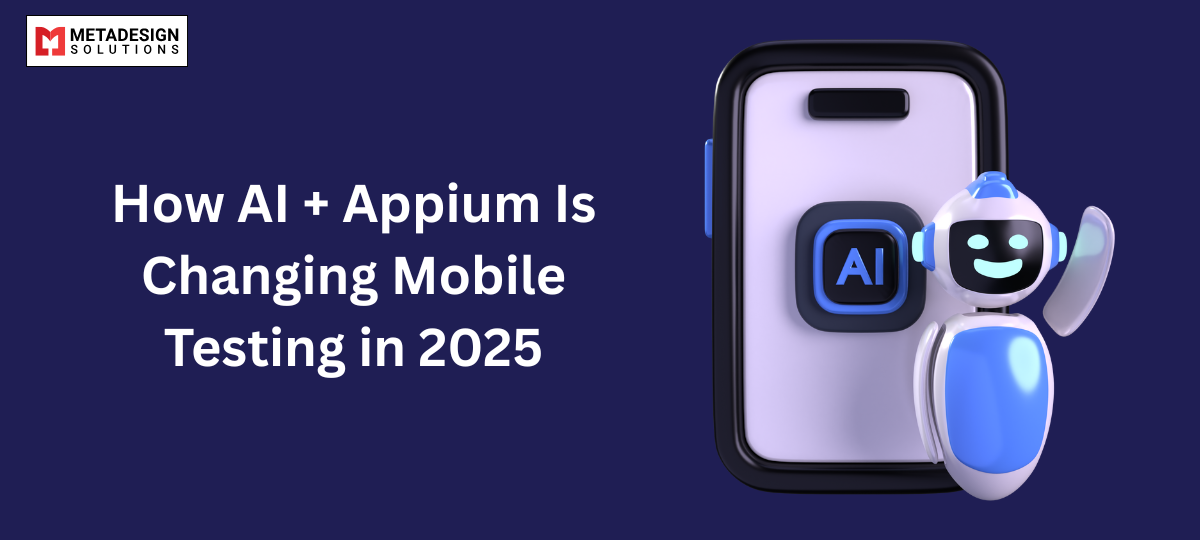Introduction to AI-Driven Mobile Testing
The world of mobile application testing is evolving at lightning speed, and 2026 marks a significant shift in how QA teams approach mobile testing. Traditionally, mobile testing was a manual, time-consuming process—requiring extensive script writing, device fragmentation handling, and endless maintenance. Then came automation tools like Appium, which allowed teams to write once and test across platforms. For companies offering Appium testing services, this was a game-changer. And now, we are witnessing the next frontier: AI-driven mobile testing.
Artificial Intelligence is revolutionizing the QA industry by enabling intelligent test automation. From generating test cases to auto-healing broken scripts and analyzing patterns in test failures, AI is doing what human testers took hours or days to achieve. When combined with tools like Appium, it creates a powerful ecosystem that enhances test coverage, stability, and speed.
This blog dives into how AI + Appium is reshaping mobile testing in 2026, offering organizations a smarter way to ensure quality at scale—while keeping pace with rapid release cycles.
Embrace AI-Driven Mobile Testing
Looking to modernize your mobile QA process?
Schedule a consultation with MDS to integrate AI-powered Appium testing into your workflow.
What Is Appium and Why Is It Popular for Mobile Automation?
Appium is an open-source tool designed for automating native, hybrid, and mobile web applications on iOS and Android platforms. Its biggest advantage lies in its flexibility and simplicity. Appium supports multiple programming languages like Java, Python, Ruby, and JavaScript through the WebDriver protocol, allowing QA teams to leverage their existing tech stacks. For organizations seeking comprehensive QA Automation Testing Services, Appium serves as a reliable foundation to enhance test coverage and streamline automation processes across diverse mobile applications.
Here are a few reasons Appium became the go-to solution for mobile automation:
- Cross-platform compatibility: Write your test script once and run it on both Android and iOS.
- No need to recompile apps: Appium doesn’t require modification or instrumentation of the app under test.
- Large community and plugin ecosystem: Continuous support and regular updates keep it relevant.
- Integration with CI/CD pipelines: Appium can be seamlessly integrated into modern DevOps workflows.
Despite these advantages, Appium has challenges—mainly around test maintenance, flakiness, and device fragmentation. That’s where AI steps in to elevate Appium to the next level.
The Role of AI in Test Automation Today
AI in test automation has become more than just a buzzword. It represents a set of technologies that learn from test runs, adapt to changes in code, and make intelligent decisions during test execution. In 2026, AI is no longer optional—it’s a core component of QA strategies.
AI’s key contributions to test automation include:
- Predictive analytics for identifying high-risk areas of the app
- Auto-generation of test cases based on user behavior and logs
- Visual testing and comparison using AI-based image recognition
- Self-healing tests that adapt when elements change
- Faster root cause analysis for failed test cases
Most importantly, AI reduces the manual overhead of writing and maintaining tests, allowing QA teams to focus more on strategic quality efforts rather than script babysitting.
AI + Appium: A Powerful Combination
While Appium provides a robust foundation for mobile test automation, AI brings the intelligence needed to scale and optimize that automation. The combination of AI and Appium creates a dynamic testing system that is:
- Adaptive: AI learns from failures and test trends to suggest improvements.
- Efficient: Reduces redundant tests and focuses on high-impact test areas.
- Stable: Handles UI changes better with AI-based locators and fallback mechanisms.
- Insightful: Provides deep analysis of test results and performance bottlenecks.
With modern AI engines integrated into the Appium pipeline, testers can automate test creation, perform visual validations, track real-time user journeys, and even get prescriptive feedback on test suite performance.
Several vendors are already offering Appium-based platforms enhanced by AI capabilities. These platforms track element changes, analyze test behavior across builds, and automatically heal tests—all while giving QA engineers complete control over the process.
Smart Test Generation and Maintenance
One of the most tedious parts of test automation has always been script creation and maintenance. Traditionally, testers manually write thousands of lines of code to validate UI and functional components across devices. But with the fusion of AI and Appium in 2026, this process has undergone a radical transformation.
Smart test generation leverages AI to automatically create test cases based on application flows, real-world user journeys, and historical data. These models analyze usage logs, crash reports, and code changes to identify critical test paths. The result is a suite of high-priority, high-coverage tests—often without the need for human input.
AI also enables dynamic prioritization. For example, if a recent code commit touches the payment module, the AI model can automatically prioritize regression tests specific to that module, ensuring faster validation cycles.
Test maintenance, another long-standing bottleneck, is also being streamlined. In traditional Appium environments, even a minor change in UI—like a renamed button or shifted element—could break dozens of tests. AI now enables element-level intelligence, which understands the intent behind user actions and can map them even when IDs or XPaths change. This means fewer test failures due to minor UI changes and more time saved fixing scripts.
AI can also detect redundant or obsolete tests by monitoring test effectiveness over time. It flags test cases that consistently pass without catching bugs or that never execute due to logic paths. This helps teams prune their test suite and optimize execution.
Self-Healing Test Scripts with AI
In 2026, one of the most celebrated applications of AI in mobile testing is self-healing automation. In the Appium world, where UI selectors frequently break due to app updates or platform variations, AI plays a critical role in maintaining script integrity.
So, what is self-healing?
It refers to the ability of test scripts to automatically adapt to changes in the application under test. For example, if an element ID changes from btnSubmit to submitButton, traditional Appium tests would fail unless updated. With AI, the system can recognize the context and purpose of the button and dynamically locate the updated element based on visual cues, historical patterns, or surrounding DOM structure.
Here’s how self-healing typically works in modern AI-enhanced Appium systems:
- The test script runs and encounters a broken locator.
- The AI engine compares the current screen with historical data and identifies potential matches using semantic understanding.
- If confidence is high, the script continues execution using the new locator.
- Logs are generated to notify testers of the auto-correction.
This not only reduces test flakiness but also minimizes downtime during regression cycles. It’s particularly valuable for agile teams practicing continuous delivery, where the app’s UI may evolve weekly, if not daily.
Self-healing also contributes to test reliability across devices. Mobile apps often behave differently depending on OS version, screen resolution, or device brand. AI recognizes these contextual nuances and applies adaptive locators that work universally, vastly improving cross-device automation reliability.
Faster Debugging and Flaky Test Reduction
Flaky tests are the nemesis of every QA team. They’re tests that fail intermittently—sometimes passing, sometimes failing—without any changes to the application. This inconsistency leads to lost productivity, mistrust in automation results, and delayed releases.
With AI in the picture, flakiness is no longer an unsolvable mystery. Advanced analytics engines now detect patterns in flaky test behavior, such as:
- Execution order dependencies
- Element visibility delays
- Device-specific inconsistencies
- Memory or performance bottlenecks during tests
In AI-enhanced Appium environments, each test run generates detailed execution logs, enriched with screenshots, video recordings, and timing metrics. AI models comb through this data to surface root causes—often pinpointing issues like delayed animations or poor network handling.
AI can also cluster flaky tests by behavior, allowing QA teams to address systemic issues instead of one-off failures. For instance, if 10 tests fail due to slow API responses, the system may recommend increasing timeouts or introducing retries in a specific area rather than blindly debugging all 10 scripts.
Some advanced platforms even provide recommendations or auto-remediation—suggesting updated wait conditions, adding fallbacks, or removing unnecessary dependencies from test steps.
By reducing the noise from false failures and flakiness, AI gives testers back the confidence they need to rely on automation and helps teams maintain high delivery velocity.
When to Adopt AI + Appium for Your Mobile QA Strategy
If your team is still relying on traditional automation scripts or manual testing alone, 2026 is the year to reconsider. Adopting AI-powered testing with Appium makes sense in several scenarios—and understanding the right time to transition can maximize your ROI.
Rapid Release Cycles
If your team practices Agile or CI/CD with multiple releases per week or month, traditional test automation may not keep up. Tests often break, maintenance becomes a full-time job, and flaky results slow you down. AI + Appium helps you maintain stable automation while moving at modern development speeds.
Large-Scale App Portfolios
Organizations with multiple apps or complex apps across iOS, Android, and tablets need scalable testing. With AI-driven automation, you can reuse test logic across platforms, and AI can adapt tests dynamically for device-specific variations—cutting down on scripting time.
Growing QA Teams and Skill Diversity
In teams where not every QA member is a seasoned automation engineer, AI levels the playing field. Auto-generated tests, low-code/no-code interfaces (often built atop Appium), and visual debugging help everyone contribute—regardless of their coding skills.
Flaky Test Syndrome
If your team constantly suffers from false positives and unreliable test runs, AI + Appium can be a game-changer. Self-healing scripts, smarter wait conditions, and dynamic locators drastically reduce flakiness, saving hours of debug time each sprint.
Focus on User Experience
With AI’s ability to integrate visual testing, accessibility validation, and even performance monitoring, you can expand your QA focus beyond simple functional correctness to total experience quality—something that’s crucial in the mobile-first era.
Ultimately, the decision to adopt AI-enhanced Appium isn’t about replacing human testers—it’s about empowering them. With the repetitive and error-prone aspects of testing delegated to machines, your QA team can focus on what matters: quality strategy, UX, and innovation.
Learning Resources to Get Started
Whether you’re a QA engineer, test lead, or developer aiming to upgrade your testing stack, plenty of resources are available to get started with AI + Appium:
Appium Fundamentals
- Appium Official Docs
- GitHub repositories like Appium Pro provide practical examples and use cases.
AI in Test Automation
- Blogs and whitepapers from vendors like Testim, Applitools, TestSigma, and Katalon often share real-world case studies on AI testing.
- Explore courses on platforms like Coursera and Udemy that cover AI in software testing, ML for QA, and intelligent automation practices.
Hands-On Practice
- Set up a local or cloud-based Appium grid using services like BrowserStack, Sauce Labs, or LambdaTest.
- Try AI-powered platforms with Appium integrations to see how self-healing and smart test generation work in real time.
Communities and Conferences
- Engage with Appium and AI testing communities on Reddit, Stack Overflow, GitHub, and Discord groups.
- Attend QA-focused events like SeleniumConf, Test Automation University Live, or AI Testing Summits to stay updated with trends and tools.
Learning AI-driven testing doesn’t mean becoming a data scientist. You simply need to understand how the models work in context—how they interpret patterns, learn from test data, and enhance test coverage. And with the number of platforms simplifying adoption, even small QA teams can get started quickly.
Conclusion: The Future of Mobile Testing with AI + Appium
The synergy between Appium and AI is more than just a trend—it’s a fundamental shift in how we approach mobile quality assurance. In 2026, teams no longer have to choose between speed and reliability, or between automation and insight. With AI-enhanced Appium testing:
- You gain smarter, more resilient test scripts that evolve with your app.
- You automate more with less effort, increasing test coverage without overburdening your QA team.
- You drastically reduce flaky failures and focus only on what matters—actual bugs.
- You enable continuous testing in real-world device environments with greater confidence and lower maintenance costs.
The benefits are clear: faster feedback cycles, more stable releases, and happier users. And as AI continues to evolve—bringing even more intelligent debugging, predictive risk analysis, and autonomous testing capabilities—the potential of AI + Appium will only grow.
In short, this is not just the future of mobile testing. It is the present. Teams that embrace this transformation will not only ship faster but will also deliver better-quality apps—across platforms, at scale, and with confidence.
Related Hashtags:
#AISoftwareSolutions #QAAutomation #FlakyTests #SmartDebugging #AIDrivenTesting #TestAutomation #SoftwareTesting #CICD #DevOpsQA #QAEngineering


